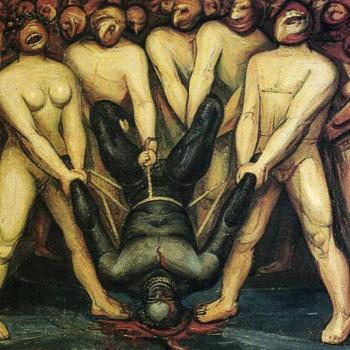If you’re looking for a podcast that speaks to the political and spiritual confusion of our times with grace, humor, intelligence, and insight, consider Know Your Enemy. Hosted by journalists Matthew Sitman (an editor at Commonweal Magazine and Dissent Magazine contributor) and Sam Adler-Bell (who has written for The Intercept, The Outline, and Commonweal), and sponsored by Dissent, Know Your Enemy’s mission is to engage and illuminate the ideas of political and cultural conservatives; to add complexity and nuance (and even sympathy) to liberal and progressive responses to conservative ideas; in short, to take seriously the ideas of conservative “enemies” so those who oppose their vision and agenda can more effectively combat their influence.
Sitman and Adler-Bell are lefties who approach the conservative movement as an intellectually serious program and set of beliefs and ideas. Their implicit warning to liberals and progressives: Belittle or misconstrue these ideas and agendas of the right at your peril. Another way to interpret their challenge to liberals and progressives: Serious conservatives navigate by the stars of a well-mapped cosmology. What comparably robust and detailed cosmology guides you?
Since May, KYE has dropped 11 episodes, covering topics such as the history and transformation of American conservativism (part 1; part 2); the rise of the illiberal right; the national conservative movement; white supremacy and gun violence; the billionaire funding base of the conservative movement; working-class conservatism; misconceptions about “Trump Country”; and, most recently, a long conversation with Will Arbery, author of the acclaimed new play, Heroes of the Fourth Turning.
I’d like to spotlight the podcast episode focusing on the “illiberal” right, which articulates the conservative Catholic ideas and energy that power so much of the conservative political agenda, and which benefit from the personal insights of Matt Sitman, who was raised in a religious, conservative working-class family, and who for a number of years was deeply connected to some of the leading lights of the conservative Catholic intellectual community profiled in this episode. However, the Heroes of the Fourth Turning conversation with playwright Will Arbery is also amazing, and highly recommended listening.
KYE’s “illiberal right” episode helps us to understand how First Things, the most intellectually serious and influential journal of the religious right, has blown up the debate about the future of the conservative movement. In two articles published early in 2019, the magazine – which is nominally ecumenical but essentially Catholic – repudiated the “dead consensus” of American conservatism that has prevailed since the 1950s and achieved its apotheosis in the Reagan years, the grand synthesis or fusion of intellectual commitments to free markets, anti-communism, and traditional family values.
The first of these articles, “Against the Dead Consensus,” published in March, was a manifesto signed by 15 academics and public intellectuals, 14 men and one woman, generally ranging in age from 45 to 55 (the sad men of GenX), a few quite well-known (Patrick Deneen, Rod Dreher), the remainder more obscure, but all sharing a commitment to (for lack of a more precise term) Catholic communitarian principles associated with Notre Dame philosopher Alasdair MacIntyre. This manifesto repudiated the post-war conservative consensus for collapsing, in our neoliberal era, into a libertarian obscurantism (perhaps of the Mises Institute variety), emphasizing individual autonomy at the expense of connection and community, forgetting about the cultural foundations of a truly preservationist “conservatism,” and so ultimately devolving into an “echo” of liberalism itself, helpless against the rapacious and morally untenable onslaught of (presumably millennial) progressives.
Several months later, First Things dropped another bomb with the publication of an article entitled (weirdly but memorably) “Against David French-ism,” written by NY Post opinion page editor and Iranian-American Catholic convert, Sohrab Ahmari (who had also signed the “dead consensus” manifesto). In this essay, occasioned (also weirdly) by a Facebook ad for a children’s reading hour with a drag queen at a public library in Sacramento, Ahmari called out (at the time) National Review writer and “Never-Trump stalwart” David French, as the personification of this dead consensus. On the surface, it might seem odd that Ahmari would pick on David French, a long-time litigator on behalf of religious liberty with impeccable conservative credentials. But French turns out to be both an easy and logical target because the decency and civility he brings to the public square (what Ahmari refers to as his “politeness”) evince ignorance about, and weakness against, the culture warriors on the left.
In the KYE “illiberal right” episode, Sitman and Adler-Bell do a fantastic job establishing the significance and stakes of these intellectual broadsides. Many conservative intellectuals, with varying degrees of enthusiasm, have accommodated themselves to Donald Trump. Sitman and Adler-Bell acknowledge this transactional flexibility on the part of former Never-Trumpers such as First Things editor, Rusty Reno, who ended up endorsing Trump for president. And there is no doubt that what Ahmari has aptly termed Trump’s “animal instincts” have conveniently served as a pivot – or door hinge – that conservatives who favor “order, continuity, and social cohesion,” have seized upon to exit what they perceive to be the (somewhat Hartzian) internal contradictions and failings of the conservative intellectual scaffolding inherited in so many ways from William F. Buckley and The National Review.
Liberated from that carapace by the 2016 election, the First Things conservatives have aimed not-very-friendly fire at their brethren who remain committed to a “neutral space” preserved by public institutions built to negotiate and adjudicate conflicts in a pluralistic society between groups with otherwise incommensurable “private sphere” conflicts over ultimate beliefs and values (e.g., the “wedding cake baker and gay marriage maker” conflict). As Sitman and Adler-Bell tell us, the David French perspective would be that religious conservatives need to win their battle at the level of culture, the presumption being that neutral political institutions will at least guarantee a “fair fight.” Post-consensus Catholic conservatives like Ahmari instead argue that the idea of a “netural space” is itself a fantasy, with non-infrequent invocations of German-Nazi jurist Carl Schmitt’s view that politics is war by a different name, an all-consuming battle between friends and enemies. Or, in Ahmari’s words, politics requires conservatives “to fight the culture war with the aim of defeating the enemy and enjoying the spoils in the form of a public square re-ordered to the common good and ultimately the Highest Good.”
As the suprisingly graceless titles of these two calls to jihad demonstrate, First Things conservatives can specify very clearly what they are “against.” As Sitman and Adler-Bell emphasize, however, they are uncomfortably unclear about what they are “for.” What we can deduce is that for this new breed of culture war conservative, shades of gray will not do. Because “consensus” conservatives of the David French variety represent a politics uncomfortable classifying opponents as enemies they have failed to perceive, and hence are unable to combat, liberalism’s ultimate internal logic, which is the impulse toward an ever-more-unfettered, toxic, and ultimately totalitarian autonomy for who see themselves as the “Highest Good,” a self-apotheosis that has justified perverse sexual beliefs and behaviors entirely at odds with the natural order.
The KYE guys acknowledge some degree of overlap between conservative Catholic and progressive leftist critiques of liberalism and neoliberalism, specifically with reference to the idea that capitalism provides many opportunities to self-identify, to brand yourself, and that the kind of thinking and ideology produced by this economic order is anti-communitarian. However, as Sitman emphasizes, the left wants to progress beyond liberalism, with an emphasis on notions of equality, fairness, and inclusion. By contrast, the religious right wants to retreat behind it, to restore pre-liberal attributes of traditional communities nostalgically remembered as ordered, benign, and virtuous, but that almost entirely elide the hard power and entrenched inequalities pervading most of these communities.
While First Things conservatives remain remarkably coy about their utimate goals, the KYE hosts sense a profound shift from the conservative sensibilities of the 1990s, when Federalist Society and Catholic natural law critics of “activist” courts were confident they voiced the will of a heartland majority. Since 2016, of course, as the Catholic Church, in particular, has badly foundered, and as non-white urban ethnic populations have surged, it’s been abundantly clear that this “majority” no longer exists. Hence the reconstruction of an intellectual scaffolding that more openly makes the Catholic integralist case for more draconian and authoritarian rule of a minority more willing to achieve the “Highest Good” by force. Which would of course explain why intellectuals on the right articulating the case for a “national conservatism” have increasingly accommodated themselves to the “animal instincts” of the Trump era.












